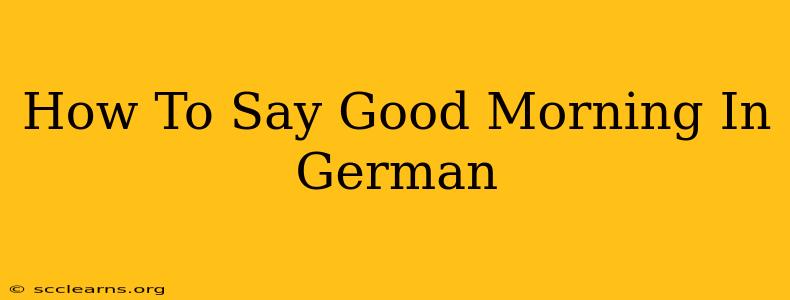Learning a new language can be incredibly rewarding, and German is no exception. One of the first things you'll want to know is how to greet people. Saying "Good morning" in German is a simple yet crucial step in mastering basic German phrases. This guide will cover various ways to say "Good morning" in German, depending on the context and level of formality.
The Basics: "Guten Morgen"
The most common and versatile way to say "Good morning" in German is "Guten Morgen". This phrase is appropriate for most situations and is understood throughout German-speaking regions. It's polite, straightforward, and a perfect starting point for your German language journey.
Pronunciation:
The pronunciation of "Guten Morgen" is relatively straightforward:
- Guten: Pronounced "goo-ten" – the "u" sound is like the "oo" in "moon," and the "t" is crisp.
- Morgen: Pronounced "mor-gen" – the "o" is like the "o" in "go," and the "g" is a soft "g" as in "gentle."
Practicing the pronunciation is key. Listening to audio examples online can significantly aid in mastering the correct sounds.
Formal vs. Informal Greetings
While "Guten Morgen" works well in most situations, German, like many other languages, distinguishes between formal and informal greetings. This distinction hinges on your relationship with the person you are greeting.
Formal Settings:
In formal settings, such as business meetings or when addressing strangers of an older generation, "Guten Morgen" remains perfectly acceptable. There isn't a significantly more formal alternative for "good morning." The key is in your overall demeanor and tone of voice rather than a different phrase.
Informal Settings:
For friends, family, and colleagues you know well, "Guten Morgen" is still perfectly appropriate. There are no significantly different informal greetings for "good morning" in German.
Beyond "Guten Morgen": Expanding Your Vocabulary
While "Guten Morgen" covers most situations, expanding your vocabulary will make your interactions richer and more natural. Consider these related phrases:
-
"Morgen!": This is a shorter, more informal version of "Guten Morgen," suitable for close friends or family. It literally translates to "morning!"
-
"Einen schönen Morgen!": This translates to "Have a beautiful morning!" and conveys a warmer, more expressive greeting. It's suitable for most contexts, adding a touch of friendliness.
-
"Schönen Tag noch!" This translates to "Have a nice day!" and can be used later in the morning as well.
Mastering German Greetings: Tips for Success
Learning greetings is a crucial first step in language acquisition. Here are some helpful tips:
-
Immersion: Surround yourself with the language. Listen to German music, watch German movies, and interact with native speakers whenever possible.
-
Practice: Regular practice is key. Use flashcards, language learning apps, or find a language partner to help you refine your pronunciation and vocabulary.
-
Context: Pay attention to the context. Understanding when to use formal versus informal greetings will significantly improve your communication skills.
By mastering "Guten Morgen" and exploring related phrases, you'll confidently navigate greetings in German and take a significant step towards fluency. Happy learning!

